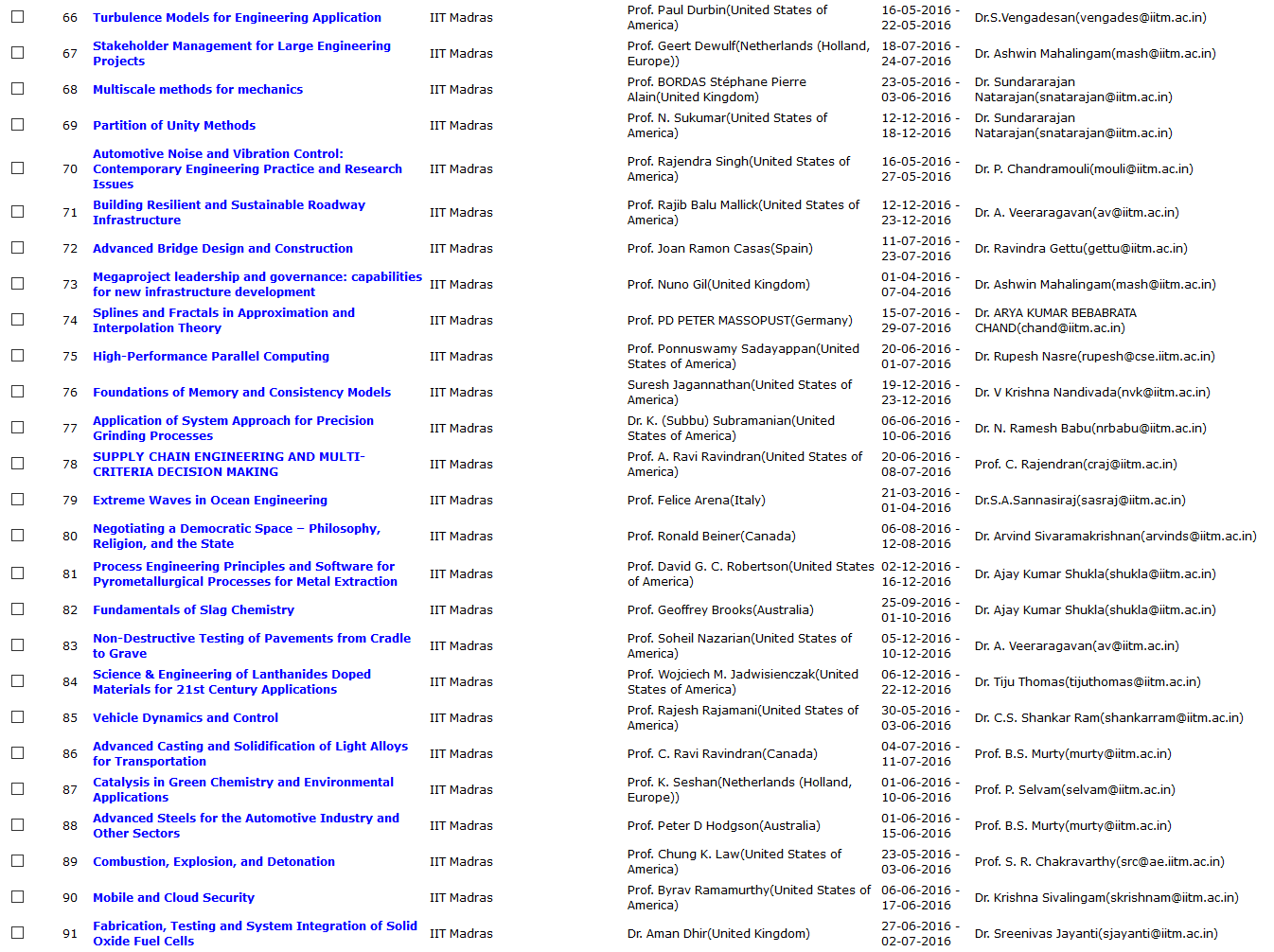About the GIAN Programme
GIAN is a new initiative of MHRD that aims to provide opportunities for Indian students to take elective courses offered by foreign faculty. By tapping the international talent pool of academicians, GIAN tries to enhance both the quality and quantity of India’s academic resources and boosts efforts to give Indian campuses a global dimension.

The GIAN programme was announced by the Government of India in June 2016. IIT Madras started participating in it only in July 2016. Initially, around 25 proposals were submitted by IIT Madras in August 2015. This number has risen to around 110 now. Out of these, 50 courses have been approved, around 55 are still under processing and the rest have been rejected. At present, IIT Madras has the largest number of approved courses under GIAN. This might be because our faculty were already in touch with the faculty from outside India and aware of the possibilities of such collaborations.
What is so Special About GIAN Courses?
A GIAN course is different from an ordinary course offered at IIT Madras due to the fact that at least half of the course is taught by an eminent foreign researcher working in that field. Moreover, GIAN courses are offered in niche areas, are very specialized and targeted at researchers actively working in that area.
GIAN courses are short courses and typically have a duration of one or two weeks with 14 lecture hours and 28 lecture hours respectively. GIAN courses are meant to give a quick overview of the various aspects of a field. Through a GIAN course, one can learn about a subject quickly, read up a little more by oneself and do research in that field. As Vinod Bajaj, a research scholar at IIT Madras, puts it – “It is a different kind of course. It is of a short duration and is very intense.”
One of the objectives of the GIAN programme is to provide an opportunity for the students of different institutes/universities to interact and learn a through collaborative learning process. This is met by ensuring that around half the students in a GIAN course are from outside the host institute or from the industry. Students from different institutes get to share their ideas while industry participants provide insights from the industry. Ankush Mahajan, a participant from Sterlite Technologies, describes GIAN coursework as “well defined coursework, useful for both beginners and experienced ones.”
The course material for a GIAN course is comprehensive and is complemented by practical assignments meant to give an insight into how things work in the real world. GIAN courses also try to stress on the contemporary happenings and possible future technologies in the domain. Moreover, the course curriculum for a GIAN course is ratified by experts in that area. Each GIAN course proposal is first screened by a panel of faculty from the host institution to ensure that there is no overlap with the courses offered at the institution. After that, the GIAN course panel reviews it at the national level. The evaluation pattern is decided upon by the host faculty in consultation with the foreign faculty. Since a grade certificate is provided on the completion of the course, there is a provision to credit the course.
Most GIAN course participants have given a feedback that their course was very interesting, exciting, extremely useful and informative but advanced and intense. Arjun Iyer, a participant of the GIAN course on ‘Optical Coherent Communication’ at IIT Madras, summarizes all that has been said about GIAN courses with the following words: “The breadth of lectures, coupled with simulation exercises give a good grasp on the fundamental concepts involved and at the same time introduce the state-of-the-art technology evolving in the subject.”
How can IITM Students Exploit this Opportunity?
Prof.C.Chandra Sekhar, Department of Computer Science and Engineering, is the Local Institute Coordinator of GIAN programme at IIT Madras. He wishes to give the following message to the students: “Make the best use of of GIAN courses. It is not everyday that one gets to listen to lectures from top level researchers in one’s field. We have eminent personalities flying in from different countries to teach these courses.”

One can get to know about a GIAN course that is going to be conducted at IIT Madras through the smail sent by the Dean of Academic Courses, a week prior to the commencement of the course. Students can also keep track of GIAN courses themselves on the GIAN portal. There are plans to set up a GIAN portal solely for IIT Madras. Also, there is a list of approved courses across all institutes in India available at this web page. Note that an IIT Madras student can do GIAN courses at other institutions as well.

The procedure for registering for a GIAN course is as given below.
1. Register on the GIAN portal and fill in one’s personal details.
2. Pay the one-time non-refundable enrollment fees of Rs 500 for using the GIAN service.
3. Register for the chosen course on the GIAN portal.
4. Wait for a confirmation mail from the course coordinator.
5. Pay the course registration fee to the host institute as per the directive of the Course Coordinator. For GIAN courses offered at IIT Madras, the course registration fee for students is fixed at Rs 1000 for a 1-week course and Rs.2000 for a 2-week course. The registration fee may be different for the courses offered at the other institutions.
Prof. Chandra Sekhar offers his views on managing GIAN coursework alongside IITM coursework. He says, “Keeping the convenience of students and faculty in mind, we plan to offer the GIAN courses during semester breaks or late in the afternoon or evening in case of courses during the semester. In a GIAN course, typically 3 lecture hours are conducted each day. Hence, it would be difficult to take a GIAN course during a semester in which one has a full course load. Therefore, students should plan their coursework in advance, based on the GIAN course schedule. For example, if a student wants to take 2 GIAN courses in a semester, he should drop a similar number of credits from the IIT Madras courses. The 1-week GIAN course carries 1 credit and the 2-week GIAN course carries 2 credits as per the old curriculum. It is not compulsory for the students to credit a GIAN course. The students who opt to credit for a GIAN course will be given a grade after the evaluation is complete. The student can then request for inclusion of the GIAN course in the grade sheet with the approval of the Faculty Advisor and the Head of the Department. The students who do not credit for a GIAN course will be given only the participation certificate.”
Prof. Chandra Sekhar is of the opinion that the introduction of GIAN courses won’t lead to flooding of courses at IIT Madras. Although around 100 courses are likely be offered at IIT Madras under the GIAN programme in the year 2016, there would be enough takers for them as GIAN courses are mainly aimed at graduate students who don’t have a limit on the number of courses they can take. Moreover, it will be ensured that courses with basic content or having an overlap with the institute’s courses will be screened out. It is expected that students will not take more than 2-3 GIAN courses in an year.
In conclusion, we would like to mention that another main aim of the GIAN programme, apart from providing some fresh ‘Gyan’, is to create avenues for possible collaborative research. In the time apart from the class hours, the international faculty will interact with the host faculty and the students. Possibly, exchange visits of faculty and students could be arranged. Their students and faculty could come here and work for some time. Our students could also look for a summer internship at the universities of the international faculty. To make all this happen, the GIAN programme envisions active support and participation from the students.


